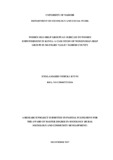| dc.description.abstract | The purpose of the study was to examine women self-help groups as vehicles to women empowerment. The main objective of the study was to examine the contributions of self-help women groups. Three theoretical frameworks informed this study, namely; Theory of social capital theory, Social Network theory and Feminist theory. The study was carried out in a residential sub urban settlement in Mathare Valley, Nairobi, Kenya. A descriptive study design was adopted and a sample of 88 respondents was drawn from a universe of 393 women in self-help groups. Quantitative primary data were obtained through a survey method and analysed using SPSS while supplementary qualitative data were obtained through key informant interviews and analysed manually.
The study findings established that majority of women (80%) in self-help groups were middle aged between 21 and 40, had no stable sources of income, and a majority (74%) who were either married or single were with family sizes averaging between 1 & 3 children. The average group size was 18 and majority of the groups were not registered with government agencies. The level of participation and group activities also seemed to decline with the period of existence. Younger groups (2-3 years of existence) tended to meet regularly and have vibrant activities than older groups. Motives to joining self-help groups were either social or economic though social exceeded economic motives by 2%. Equally the reported social benefits were greater than economic benefits by 16%. These findings demonstrate social and economic benefits as they were inextricably interlinked in all groups studied. The most common economic activities reported were the ROSCAS and ASCRAS whereas major social activities reported were supporting social events such as burial and weddings. Most (66 %) groups reported external support mainly informs of trainings and was mainly provided by non-governmental organizations. Groups did however report that major constraint was financial.
This study concluded that women groups are powerful tools for empowering women and can be used as a means to enhance the status of women in society as well as advancing national goals of gender empowerment and improvement of societal welfare. This implies that the Kenyan government should provide both policies and programs that support, nature and promote women groups as both social and economic entities | en_US |



